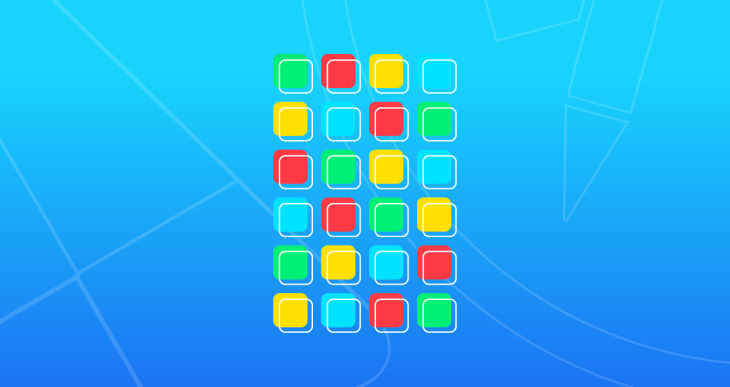Welcome back to This Week in Apps, the weekly TechCrunch series that recaps the latest in mobile OS news, mobile applications and the overall app economy.
Global app spending reached $65 billion in the first half of 2022, up only slightly from the $64.4 billion during the same period in 2021, as hypergrowth fueled by the pandemic has slowed down. But overall, the app economy is continuing to grow, having produced a record number of downloads and consumer spending across both the iOS and Google Play stores combined in 2021, according to the latest year-end reports. Global spending across iOS and Google Play last year was $133 billion, and consumers downloaded 143.6 billion apps.
This Week in Apps offers a way to keep up with this fast-moving industry in one place with the latest from the world of apps, including news, updates, startup fundings, mergers and acquisitions, and much more.
Do you want This Week in Apps in your inbox every Saturday? Sign up here: techcrunch.com/newsletters
Top Stories
The Apple-Epic antitrust battle resumes
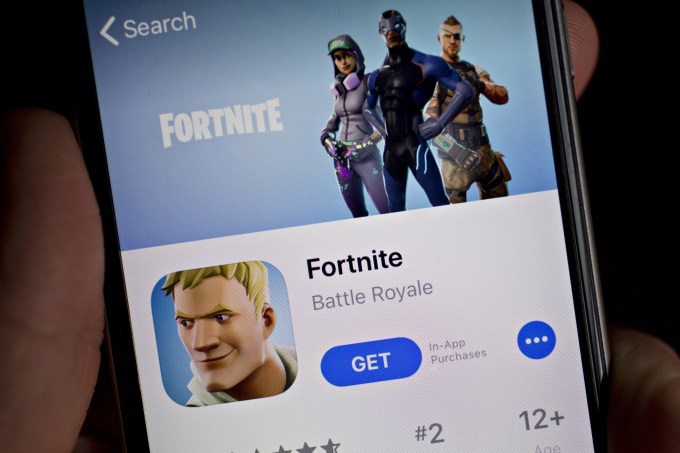
Image Credits: Andrew Harrer/Bloomberg / Getty Images
This week, Apple’s antitrust battle against Fortnite maker Epic Games returned to the courtroom after both sides appealed last year’s ruling in a potentially precedent-setting case over Apple’s alleged anti-competitive behavior. Last year, a U.S. District Court judge had largely favored Apple by ruling the tech giant was not acting as a monopolist with regard to its App Store practices. Epic Games was unhappy with that decision, of course, as it had wanted the court to force Apple to support third-party payments and/or third-party app stores which would have allowed Fortnite to maximize its revenues. Meanwhile, Apple didn’t want to agree to the court’s order that said it would have to permit apps that provide links to alternative payments.
Oral arguments kicked off this week at the U.S. Court of Appeal for the Ninth Circuit, in what will be an even higher-stakes trial for determining Apple’s future in the app market and its ability to set its own rules around payments and commissions. This time around, the U.S. Department of Justice and the State of California were granted time to present their own arguments to help explain the proper legal framework for evaluating the antitrust claims against Apple. Though both were technically being neutral, they expressed concerns over how the lower court had too narrowly interpreted parts of U.S. antitrust law, the Sherman Act, among other issues. The DoJ, notably, is in the early stages of filing its own antitrust suit against Apple, so how the appeals court rules on this matter could ultimately shape its own ability to effectively prosecute Apple further down the road.
In the opening arguments, the lawyer for the DoJ, Nickolai Levin, began by stating the district court erred in saying the Apple Developer Program Licensing Agreement (DPLA) is not concerted action. He explained that Section 1 of the Sherman Act prohibits contracts that restrain trade, which would include the licensing contract Apple is enforcing here. While the U.S. government wasn’t prepared to call out Apple’s contract as either reasonable or unreasonable, it wanted the court to understand that it was not above Section 1 scrutiny.
One of the judges pushed back against this claim, asking if Epic had actually agreed to Apple’s Developer Program Licensing Agreement with the intention of “going forward to restrain trade?” He suggested Epic signed in order to get into a market, actually. The lawyer responded that’s true, but the terms of the contract are binding, with one party forcing terms on another — so excluding contracts from Section 1 scrutiny would allow anti-competitive terms to go unpunished.
The court also asked for information on how the government believes the pro-competitive and anti-competitive effects should be weighed against one another to make a judgment, as there was no specific formula to make such a calculation. Levin explained that this boiled down to whether or not the effect of the restraint was to suppress or restrict competition, and cited legal precedent to guide the judges’ understanding.
The U.S. government also believed the lower court misapplied the rule of reason and erred in how it analyzed monopoly power. For example, Apple was able to set prices and keep them there regardless of what its competition did. “And, as Microsoft explained, that’s something only a monopolist can do,” Levin noted.
Of course, Apple’s legal team came well-prepared too. And, as one judge discovered, Apple’s lawyer, Mark Perry, who had been a longtime partner at Gibson, Dunn & Crutcher, was now at a new firm, Weil. But that didn’t mean Apple had changed firms — it just meant it now had two. Or as Perry put it, “we are one big happy family.”
Perry’s arguments re-iterated points from the lower court’s decision, particularly noting that the iPhone was designed to be more secure than the Mac, which is why there’s no “sideloading,” and instead puts apps through human review. And it’s a requirement that’s hard-coded into the iOS, the lawyer explained. “That’s a technical requirement. Apple then reflected that in the DPLA,” he said.
The lawyer also told the court Apple does allow developers to communicate with their users, and there are “no restrictions on communications.” Expect, of course, the restrictions he mentioned in his very next breath: that “Apple does not allow links and buttons because we can’t review them. We can’t track them. We can’t protect users from malware, fraud, porn, hackers, and all those other things. It would be a breach in the wall, an opening that bad actors could exploit. And it’s not well-thought-out.”
The case will likely continue for six months or more, so don’t expect any near-term resolution. And, if neither party is satisfied, it will likely be appealed to the Supreme Court, delaying the decision even longer.
Apple faces a potential class action lawsuit over data collection practices
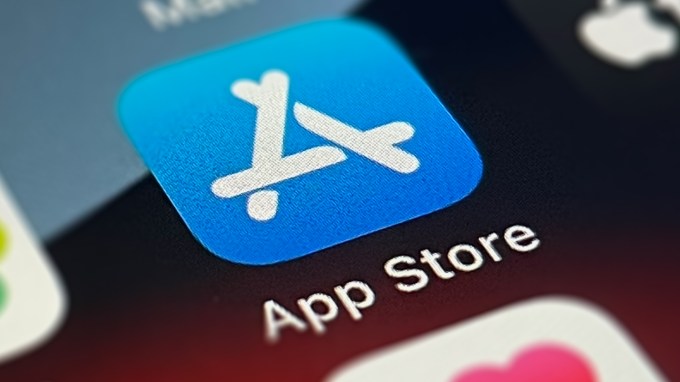
Image Credits: TechCrunch
While the Epic-Apple antitrust battle is one of the most significant lawsuits facing Apple right now, the company was also sued this week over another matter.
Another lawsuit is taking on Apple’s data collection practices in the wake of a recent report by independent researchers who found Apple was continuing to track consumers in its mobile apps, even when they had explicitly configured their iPhone privacy settings to turn tracking off. The proposed class action lawsuit, filed by plaintiff Elliot Libman on behalf of himself and other impacted consumers, alleges that Apple’s privacy assurances are in violation of the California Invasion of Privacy Act.
As reported last week by Gizmodo, app developers and independent researchers Tommy Mysk and Talal Haj Bakry discovered that Apple was still collecting data about its users across a number of first-party apps even when users had turned off an iPhone Analytics setting that promises to “disable the sharing of Device Analytics altogether.” In their tests, the researchers examined Apple’s own apps including the App Store, Apple Music, Apple TV, Books, and Stocks, and found that disabling this setting as well as other privacy controls didn’t impact Apple’s data collection.
The plaintiff is looking to have the lawsuit certified as a class action and is seeking compensatory, statutory, and punitive damages in addition to other equitable monetary relief.
Google Play revamps policies around kids’ apps
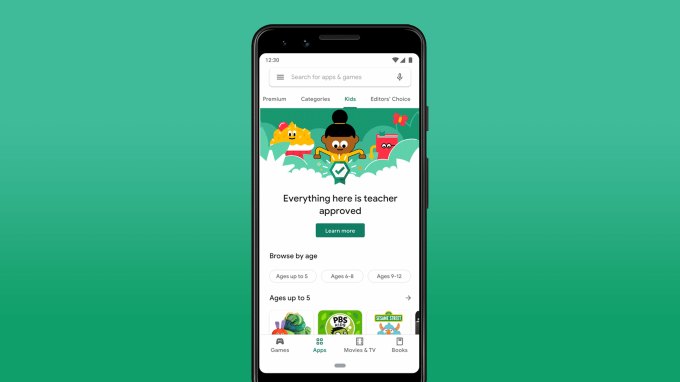
Google Play rolled out a series of changes to its programs and policies around apps designed for children. The company described the update as an expansion of its previously launched “Teacher Approved” program, which includes a review process where teachers and experts vetted apps not just for safety and security elements, but for educational quality and other factors. The newly revamped policies will now impact how apps qualify for this program, which allows apps to gain entry to the Play Store’s “Kids” tab.
Before, Google Play ran two (sometimes overlapping) programs around apps aimed at kids.
App developers were required to participate in Google’s “Designed for Families” program if their app was aimed at children, and could optionally choose to participate in the program if their app targeted both kids and older users. The Designed for Families program included a number of requirements around the app’s content, its functionality, use of ads, data practices, use of warning labels, feature set, underlying technology components, and more. Any apps in this program were also eligible to be rated for the Teacher Approved program, which had stricter guidelines, but entry was not guaranteed.
Now, the additional policy requirements for the Designed for Families program are being rolled into the Play Store’s broader Families Policy. This simplifies the rules for developers building apps for kids and opens up a broader selection of apps to be eligible to be rated for the stricter Teacher Approved program, as well.
The changes aren’t just about serving developers or consumers — they also help Google to meet stricter regulations being considered, drafted, and enacted worldwide around how software is permitted to handle kids’ data — such as the EU’s GDPR and the U.K.’s Age Appropriate Design Code. Failure to meet these requirements can result in significant penalties, as Meta recently learned when it was fined roughly $400 million for how it treated children’s data on Instagram, for instance.
Weekly News
Platforms: Apple
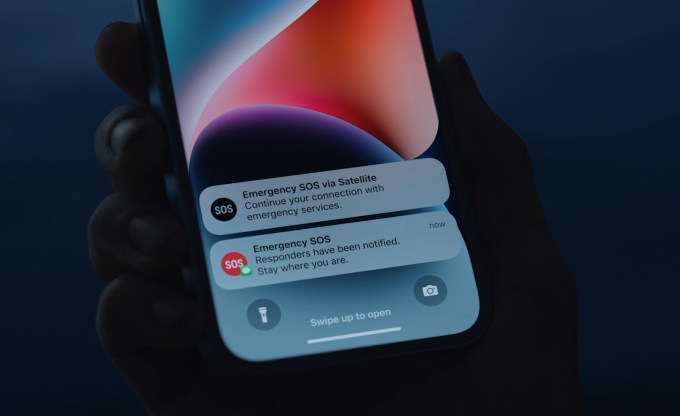
Image Credits: Apple
- Apple launched Emergency SOS via Satellite, the iPhone 14 and 14 Pro’s new feature that uses satellite to route calls in the event of an emergency when cellular access isn’t available. The feature is first becoming available in the U.S. and Canada, and will expand to France, Germany, Ireland, and the U.K. next month.
- Apple released iOS 16.2 beta 3, iPadOS 16.2 beta 3 tvOS 16.2, watchOS 9.2 beta 3, and macOS Ventura 13.1 beta 3.
- Apple’s iOS 16.2 beta added new watchlist sorting options for the Stocks app, which are reflected in an updated Home Screen widget. Now, users will be able to sort manually, by price change, percent change, market cap, symbol, or name.
- The newest beta also introduced new toggles for the Always On Display that let users turn off the Wallpaper and Notifications when the Always On Display is enabled.
- A new report by The Information seemingly refutes an earlier Bloomberg report which claimed Apple was targeting to 3x the revenue from its ad business. Instead, the new report claims Apple isn’t planning to introduce more ads on iPhone and is satisfied with the current revenue growth. It notes also that Apple killed a plan in 2018 to run ads in Spotlight Search on iPhone.
- Craig Federighi reportedly responded to a customer’s email complaint about how Apple’s software beta program isn’t effective in listening to user feedback, saying “I agree that the current approach isn’t giving many in the community what they’d like in terms of interaction and influence,” and “We haven’t yet figured out how to achieve that in a practical and constructive way. We’ll keep thinking.”
Platforms: Google
- Google wrapped up its Android Dev Summit on Monday, Nov. 14, with a track that included nearly 20 talks focused on developer features and guidance around Android 13, like how to migrate apps to Android 13, how to build user trust with privacy-respecting workflows, how to improve a social app’s quality with the Android camera and much more. This was the last of three tracks for this year’s Summit, following the two prior tracks: Modern Android Development and Form Factors. The keynote, recaps and full sessions playlists can be found on YouTube.
- Google released its Android Health Connect app into public beta. The new app helps to centralize access to health and fitness data from various eligible apps, starting with a launch group of 10, including MyFitnessPal, Oura and Peloton.
- Google Play added support for UPI (Unified Payments Interface) subscriptions in India. UPI is the most popular mobile payments technology for p2p and merchants in the region but had not yet been available as a payment option for subscriptions on the Play Store until now. It has been available since 2019 for app sales and in-app purchases, however.
- A new Google Play test that involved a discovery feature for finding new apps and games with ongoing events and updates was mistaken for a new ad unit by 9to5Google. The test appears to actually involve the merchandising units previously called LiveOps, now rebranded to “Promotional Content,” which Google had recently said would begin to appear more deeply integrated in the Play Store going forward.
E-commerce/Marketplaces
- YouTube launched Shorts shopping features that let select creators tag items in their videos to diversify their revenue streams. The feature is being piloted with U.S. creators, while viewers in the U.S., India, Brazil, Canada and Australia can view and interact with these tags for the time being. The shopping functionality will expand to more creators next year. The move follows last week’s launch of a TikTok Shop test in the U.S. YouTube is also testing an affiliate program in the U.S. where creators could earn commissions when viewers purchase recommended products.
- Shopify’s Shop app is testing a universal search feature with some users. The feature offers a “Search for anything” box that lets consumers search across their purchases, merchants matching the search term and products sold by Shopify merchants.
- Mobile marketplace OfferUp is laying off about 19% of its staff, noting it had grown headcount at a rate that had outpaced revenue growth over the past few years. The company had just under 500 employees on LinkedIn at the time of the announcement.
- 3D scanning app NetVirta announced a partnership with Victoria’s Secret that will allow the retailer to use its tech to help customers find the perfect-fitting bra.
Augmented Reality
- Just in time for the COP27 climate conference, Meta released a climate card game using Meta AR Filters, built by creator Okhule Fallet, which displays question prompts around key climate issues designed to get people talking.
- Snapchat added a set of new features to celebrate the upcoming FIFA World Cup, including new AR experiences that let fans virtually try on official team jerseys and show their team pride.
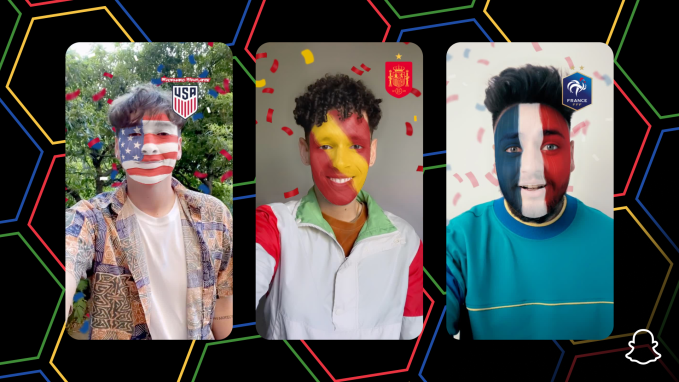
Image Credits: Snap
Social
- Instagram’s Marketing API has been updated to allow for ads on the Instagram Explore home page, through the existing Marketing API endpoint where a new INSTAGRAM_EXPLORE_HOME placement option has been added. Instagram recently announced its plans to increase its ad load, as Meta fights a revenue decline. This included the addition of ads on the Explore home page and in the profile feed.
- Twitter appointed an “acting” data protection officer (DPO) after a series of resignations of senior Twitter privacy and security staffers late last week which included the abrupt departures of Twitter’s CISO Lea Kissner; chief privacy officer (and DPO) Damien Kieran; and chief compliance officer Marianne Fogarty. Now, an existing employee, Renato Monteiro, will serve as Twitter’s “acting DPO.”
- In addition to layoffs and voluntary departures, Twitter’s new owner Elon Musk has also now fired around 20 employees who criticized him in the company Slack.
- When he’s not destroying Twitter’s workforce (or morale) or asking remaining workers to commit to “hardcore” hours, the company seemingly began work on a long abandoned project to encrypt Twitter DMs, code in the Android app revealed.
- TikTok is said to be approaching laid-off Twitter and Meta engineers to join its Silicon Valley office. The video app aims to roughly double its staff in Mountain View, Calif., to about 2,000, The Information reported.
- Social livestreaming app Yubo, popular with Gen Z, is expanding its audio moderation technology to the U.K., Australia and Canada. The tech works by recording and transcribing 10-second snippets of audio in livestreams of 10 or more people. The text is then scanned using AI to detect problematic content. If found, Yubo sends users alerts to warn them. Text that contains policy violations are also flagged for human review.
Messaging
- WhatsApp’s head of India Abhijit Bose and Meta’s public policy head for the country Rajiv Aggarwal have both left the company, just days after Meta’s India chief Ajit Mohan quit to join Snap. The departures are not related to Meta’s layoffs of 11,000 — the execs left of their own accord.
- WhatsApp introduced new Yellow Pages-like features to help its users find businesses from within the instant messaging app. This includes “Directory,” a feature launching in Brazil to help users discover small businesses nearby, as well as another feature, “Business Search,” for finding larger businesses by category. This latter feature launches select markets, including Brazil, Colombia, Indonesia, Mexico and the U.K.
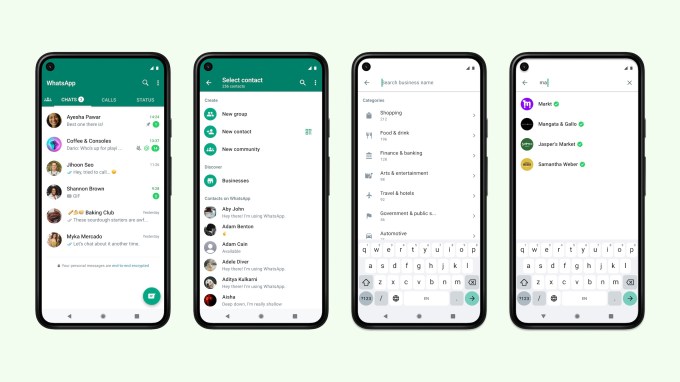
You can now search for businesses on WhatsApp
Streaming & Entertainment
- Apple is launching another original podcast, “After the Whistle” from “Ted Lasso” co-creator Brendan Hunt and NBC Sports host Rebecca Lowe. The show, launching Nov. 17, will see the hosts reacting to all the World Cup action and will be featured within Apple News in the U.S. and in Apple Podcasts in 103 markets.
- Netflix added a new feature that lets subscribers remotely log out of devices they don’t recognize or don’t want to be logged into — like those where friends, family members or an ex is mooching off your account. The feature could push more freeloaders into paid accounts, the company likely hopes.
- YouTube addressed one of YouTube Shorts creators’ chief complaints: to date, the music and sounds added to videos could only be 15 seconds in length, even though Shorts themselves can be as long as 60 seconds. Thanks to revised licensing deals, YouTube now says the majority of music on Shorts will be available in durations of up to 60 seconds. In addition, creators can “remix,” or sample, up to 60 seconds of sounds from other videos, instead of only 15 seconds, as before.
- Spotify expanded its video podcasting capabilities to Anchor creators in more than 180 markets worldwide, after initial launches in select markets, including the U.S. and parts of Europe. The company is working to offer video in competition with YouTube, but won’t share metrics about video podcasts’ adoption to date.
Gaming
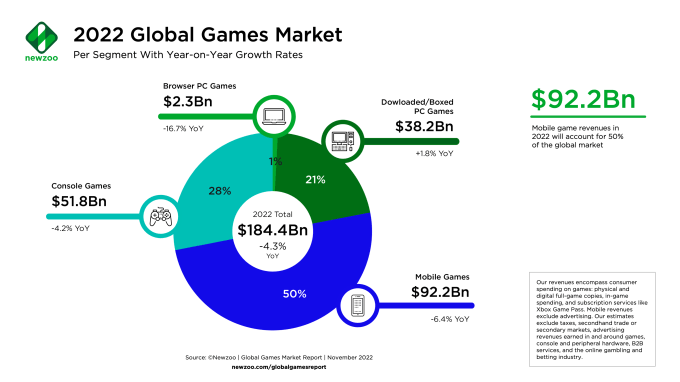
Image Credits: Newzoo
- For the first time since it began reporting, Newzoo is expecting games market revenues to decline year-over-year. The firm estimates the games market will generate $184.4 billion in 2022, down -4.3% year-over-year — a corrective year after two years of lockdown-fueled growth. The PC segment is expected to generate $40.5 billion in 2022, up +0.5% YoY, but mobile and console will decline. The mobile games market is forecast to generate $92.2 billion in 2022, down -6.4% YoY, while console gaming will drop -4.2% YoY to $51.8 billion.
- Mobile gaming accessory maker Backbone launched an Android version of its gaming controller which swaps in USB-C in place of Lightning connectivity.
Dating
- Match-owned dating app Hinge added a new feature that caters to those looking for non-monogamy. The app will add an option for adding a “Relationship Type” to the user’s profile, including “monogamous,” “non-monogamous” or “figuring out my relationship type.” Historically, Hinge had catered to those seeking a “serious” relationship, as opposed to casual hookups on Tinder, but it hadn’t well-served those with different ideas of what serious relationships look like.
Travel & Transportation
- Indian gig workers, like Uber drivers and those who work for apps like Ola, Zomato and Swiggy, are trying to reverse engineer how the apps’ algorithms and technologies work, reports Rest of World. They then share their findings in Telegram groups to help each other out with issues around why they sometimes don’t get orders, how much they’re being paid, how they’re being matched to orders, and more.
Security & Privacy
- A Reuters investigation discovered thousands of iOS and Android apps were using technology from Russian company Pushwoosh for their notifications, including apps by the CDC, U.S. Army, NRA, and Unilever.
- Google paid $70,000 to Hungary-based security researcher David Schütz, who had privately reported a bug that had allowed anyone to unlock Google Pixel phones without knowing the user’s passcode. However, the exploit required physical access to the device to work. Google took five months to fix the bug, Schütz said.
- DuckDuckGo announced App Tracking Protection is open for all Android users, in beta. The feature helps to block 3rd-party trackers in apps, even when you’re not using them.
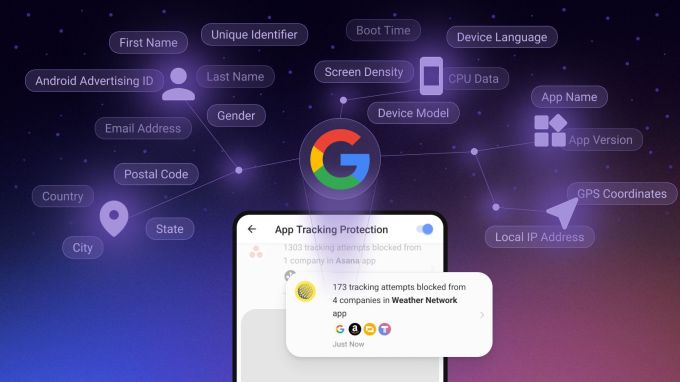
Image Credits: DuckDuckGo
Funding and M&A
💰 Dubai-based investment app baraka raised $20 million in Series A funding led by Valar Ventures. The app offers commission-free investments in U.S. stocks and ETFs.
💰 Mobile chat app Geneva raised $21 million in a Series A extension led by cryptofund Multicoin Capital. The app, which focuses on having users join interest groups, is popular with Gen Z and creators who use it to talk to fans.
🤝 Note-taking app Evernote agreed to be acquired by Milan-based app developer Bending Spoons, for an undisclosed sum. The deal is expected to close in early 2023. Evernote had raised $290 million to date.
Downloads
Vimcal
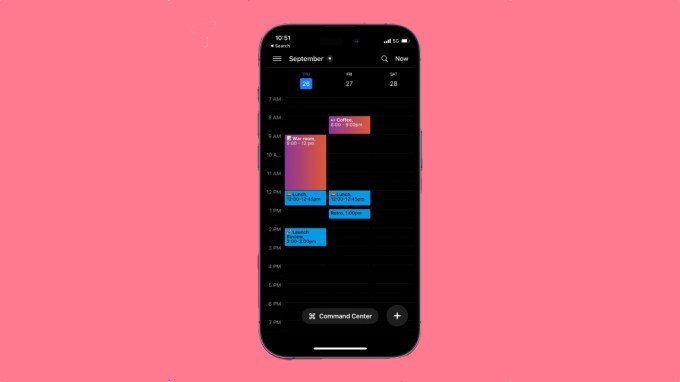
Image Credits: Vimcal
The Y Combinator-backed company Vimcal launched the iOS counterpart to its existing web and desktop calendar applications, available for Windows, Mac and Chrome. Similar to apps like Fantastical, users can type in meeting information in natural language, like “lunch with Lisa at 1 pm tomorrow.” It also offers a more customizable solution for finding timeslots for meetings, compared with existing players like Calendly. The iOS app, in beta since this April, has also optimized the software’s keyboard shortcuts for the touchscreen interface and adds other features. You can read a full review from TechCrunch’s Ivan Mehta here.
